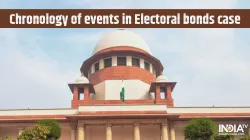Supreme Court strikes down electoral bonds scheme: Know the chronology of events
The Supreme Court's ruling declaring the electoral bonds scheme unconstitutional dealt a significant blow to the government. Here's a summary of the events leading to this landmark decision:

In a significant blow to the government, the Supreme Court declared the electoral bonds scheme for political funding "unconstitutional", citing violations of the right to freedom of speech and expression, along with the right to information.
Here's a breakdown of key events leading to this landmark decision:
Introduction of Electoral Bond Scheme: 2017
- The electoral bonds scheme was introduced in the Finance Bill.
Legal challenge by NGO: Sep 14, 2017
- NGO 'Association for Democratic Reforms' filed a petition challenging the scheme in the Supreme Court.
Notifying the scheme: Jan 2, 2018
- The Central Government officially notified the Electoral Bond Scheme.
Amendment to increase sale days: Nov 7, 2022
- The scheme was amended to extend the sale days from 70 to 85 in a year where any assembly election may be scheduled.
Referral to Constitution bench: Oct 16, 2023
- A Supreme Court bench, led by CJI DY Chandrachud, referred pleas against the scheme to a five-judge Constitution bench.
Commencement of hearing: Oct 31, 2023
- The five-judge Constitution bench, headed by CJI D Y Chandrachud, began hearing pleas against the electoral bonds scheme.
Verdict reserved: Nov 2, 2023
- The Supreme Court reserved its verdict on the matter.
Landmark judgement: Feb 15, 2024
- The Supreme Court delivered a unanimous judgement annulling the electoral bonds scheme, directing the State Bank of India to disclose details of contributors to the scheme to the Election Commission by March 6. The Election Commission is instructed to publish this information on its official website by March 13.
Also read | Electoral bond scheme: SC verdict will reinforce power of votes over notes, says Congress
